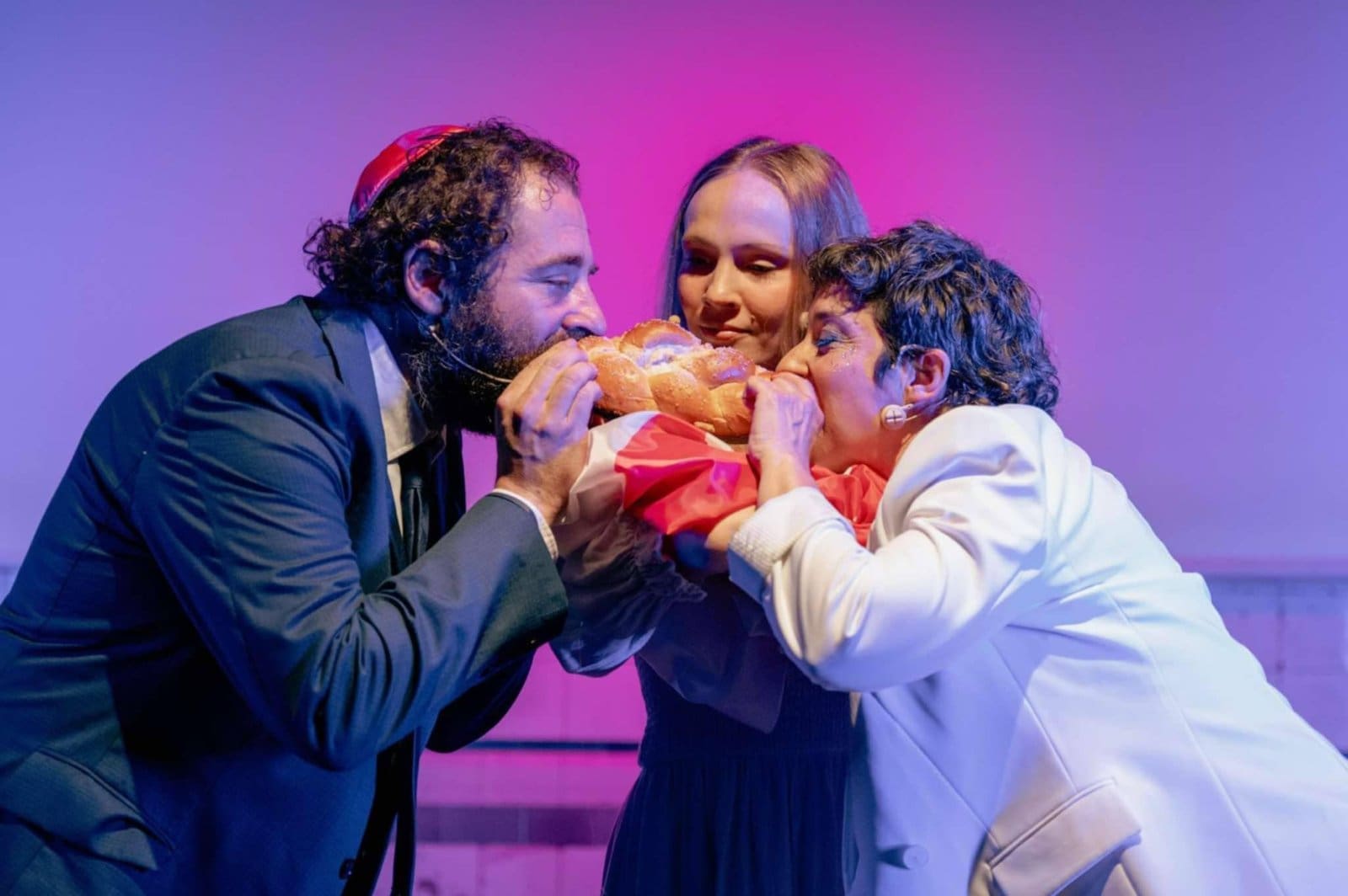A Surreal Future, A Satirical Mirror: Poland Is Not Yet Lost
By Kathryn Gainor
Prepare for a thought-provoking—and at times unsettling—theatrical experience with “Poland Is Not Yet Lost, as long as we are alive!” This bold and imaginative play, created by Dorota Abbe and Michael Rubenfeld, dives headfirst into the complex and often tense landscape of contemporary Polish-Jewish relations. Using a daring satirical lens, it paints a vivid portrait of an alternate reality that is as captivating as it is provocative.
What if?
What if the story of Jewish history in Poland took a dramatic—and surreal—turn? That question lies at the heart of Poland Is Not Yet Lost, As Long As We Are Alive, a provocative play imagined by theater artists Dorota Abbe and Michael Rubenfeld. In this alternate reality, the geopolitical map has been redrawn: Israel, as we know it, no longer exists.
In the wake of this seismic shift, three million Jewish refugees seek a new home. Their gaze turns—perhaps unexpectedly—toward Poland, a land deeply imprinted with their collective memory, filled with centuries of both profound cultural richness and unspeakable tragedy. But rather than facing closed borders or suspicion, the refugees are welcomed with open arms. The narrative upends conventional expectations of displacement and reception.
Then, the story takes a dizzying leap: Poland’s President publicly converts to Judaism, setting off a cultural chain reaction. Millions of non-Jewish Poles follow suit, fundamentally transforming the country’s religious and cultural landscape. This wave of mass conversion raises profound questions about identity, faith, and what it means to belong to a nation.
This is the bold premise of Poland Is Not Yet Lost, As Long As We Are Alive: a satirical, theatrical exploration that deftly straddles the line between the absurd and the unsettlingly familiar. By pushing the boundaries of the plausible, the play invites audiences to rethink long-held assumptions about nationalism, religion, and societal change. It isn’t prophecy or political proposal—it’s a powerful provocation, a theatrical hand grenade tossed into the stagnant waters of historical discourse.
And it’s not just a quiet thought experiment. This radical reimagining has ignited conversation, sparked debate, and challenged audiences to confront difficult questions about memory, belonging, and national identity. What would it mean for a nation so rooted in Catholic tradition to suddenly embrace a predominantly Jewish identity? How would such a shift ripple through Polish society—its laws, customs, cultural life, education, and international relations? These are the bold, complex questions this play dares to ask, urging us to reflect on the fluidity of identity and the possibility of unexpected transformation.
The Minds Behind this Audacious Premise
Dorota Abbe is a prominent and influential figure in contemporary Polish theatre. As an accomplished actress, director, teacher, and playwright, she has dedicated her career to pushing the boundaries of artistic expression and fostering meaningful dialogue. Her leadership as the artistic director of Teatr Nowy in Poznań reflects her commitment to innovative and socially relevant theater.
Abbe is known for her unflinching examination of Polish history and society, often creating works that challenge nationalist narratives and amplify the voices of those historically marginalized. Her artistic approach is marked by a willingness to tackle difficult subjects, prompting audiences to confront uncomfortable truths and reconsider established perspectives.
With a deep understanding of Polish culture and its complex history, Abbe provides a vital foundation for the nuanced, provocative nature of Poland Is Not Yet Lost. Her involvement ensures both artistic integrity and a profound engagement with the cultural context of the play.
Michael Rubenfeld is a Canadian-Jewish theatre artist who has established a significant presence in the cultural landscape of Krakow, Poland. His artistic practice is deeply rooted in themes of Polish-Jewish dialogue, memory, and the complex process of navigating the silences and intricacies left by history. As the co-founder of FestivALT—a vibrant Jewish arts and activist festival in Krakow—Rubenfeld has shown a long-standing commitment to fostering intercultural understanding and creating spaces for meaningful exchange.
His work often explores the delicate balance between remembrance and reconciliation, aiming to rebuild connections in a land marked by profound loss and historical trauma. Rubenfeld brings a unique perspective: both as an outsider immersed in Polish culture and as someone with a deep personal connection to Jewish history. This dual perspective infuses his collaborations with vital sensitivity and insight.
Rubenfeld’s experience navigating the nuances of interfaith and intercultural communication is instrumental in shaping the satirical yet deeply human exploration at the heart of Poland Is Not Yet Lost.
Michael Rubenfeld
Unpacking the Satire: A Look at the Synopsis
The play’s imagined future—Poland as a safe haven for Jews—is intentionally provocative. It confronts a history of genocide, exile, and continued discomfort with Jewish presence in Poland. For some, it’s absurd or offensive. For others, it’s a painful “what if.”
But rather than offering a simple critique, Poland Is Not Yet Lost opens up a strange kind of hope. Could such a reversal—however unrealistic—give us new ways of talking about belonging? Could it loosen some of the weight that history still presses on our conversations?
The play doesn’t offer solutions. It offers questions, satire, and space to sit with both.
Don’t miss the chance to experience this masterpiece and support Yiddishland California’s mission to foster cultural understanding through innovative artistic expression. Please register at the event here: https://yiddishlandcalifornia.org/polandisnotyetlost/.
We look forward to sharing this impactful and unforgettable experience with you!
Learn More about future events offered by YAAANA at:
References
https://teatrnowy.pl/zespol-artystyczny/dorota-abbe-kuzminska-2/
https://www.imdb.com/name/nm2168582/
https://www.mrubenfeld.com/work
https://www.imdb.com/name/nm1032371/
https://festivalt.com/en/event/poland-is-not-yet-lost/
https://festivalt.com/en/artists/michael-rubenfeld/
https://www.youtube.com/watch?v=FCijk3zC9UU




We have just returned from an incredible tour bringing Jeszcze Polska Nie Zgineta (Poland is not yet lost!) to California. We first performed the play at the University of California, Irvine, as part of the International Theater of Community Festival – a bold initiative using the power of performance to confront hate and build empathy.
Thank you to Bryan Reynolds, Zachary Price and the incredible team for such a great experience, and giving the show its English language premiere.
Following that, we brought the show to San Diego, where we were hosted by Yiddishland California. Thank you to Jana Mazurkiewicz for all the amazing work to bring the piece to your audiences.
It was a privilege to have Poland Is Not Yet Lost! echo in both of these incredible spaces.
California – thank you